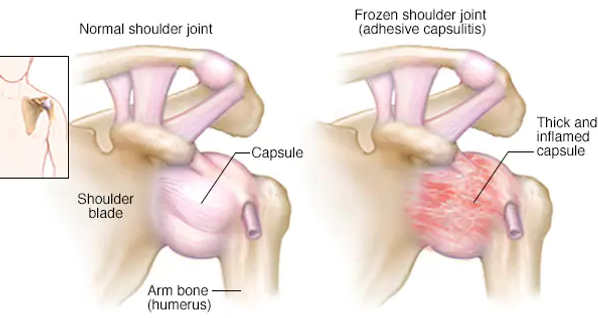ABOUT US
ABOUT US
ABOUT US

Board Certified Orthopedic Surgeon
Shoulder and Knee Specialist
FROZEN SHOULDER KANDILNOTES
INTRODUCTION
-
Frozen shoulder, aka lateral epicondylitis, is an inflammatory process that involves inflammation and shrinking of the shoulder joint capsule
-
Frozen shoulder affects patients of all ages, but is more common in females between the ages of 40-60
-
It is characterized by three stages: Freezing, Frozen, and Thawing
-
The entire process can last between 2-18 months
-
It is a very frustrating disease process as interventions are limited and the length of the disease process is longer than most other orthopedic issues
-
Frozen shoulder in one shoulder may predispose you to developing the problem in the other shoulder
CAUSES
-
The exact pathophysiology is unknown
-
Risk factors include diabetes and thyroid problems
-
It is thought to be triggered by an injury that snowballs into an inflammatory process, however many cases occur insidiously without any known or obvious cause
SIGNS AND SYMPTOMS
-
Frozen shoulder is characterized by shoulder pain and stiffness
-
Range of motion is significantly limited
-
Pain is often present at all times, including sleep, but is usually worse with activities
TREATMENT
-
Most cases of frozen resolve without any surgical intervention
-
Gentle passive range of motion and stretching program is the bedrock of treatment for frozen shoulder. The goal is to maintain motion and avoid further stiffness and pain
-
Anti-inflammatories such as ibuprofen can be helpful in decreasing inflammation
-
Electrical stimulation has been shown to be helpful in some cases although evidence is sparse
-
Shoulder steroid injections can help decrease inflammation and pain in the shoulder joint
-
Surgery is reserved for cases that don’t improve after 6 months of conservative management if symptoms are significantly affecting activities of daily living and quality of life. Surgery is composed of an arthroscopic lysis of adhesions and manipulation under anesthesia
PREVENTION
-
For patients with diabetes or thyroid issues, managing their glucose or thyroid hormone levels is very important
-
Maintaining a shoulder stretching and mobility program as part of your daily routine may decrease the chance of developing frozen shoulder
-
Avoiding traumatic injuries can help manage shoulder inflammation and lower risk of frozen shoulder



